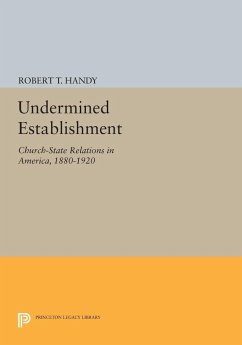In the middle of the nineteenth century, a stable relationship between American religious organizations and the state was taken for granted. Concord prevailed between the Christian (and largely Protestant) "establishment" on one side and governmental bodies on the other. Here a preeminent scholar of American religious history shows what happened when that settled relationship was tested and challenged. The decades from 1880 to 1920 were marked by an unprecedented influx of immigrants (many of whom were Catholics and Jews), increasing conflicts between public and private school systems, excitement over imperialism, the growth of progressivism in politics, the rise of the social gospel, and the impact of World War I. Providing an overview of how these developments affected church-state relationships, Robert Handy's work is fascinating as a view of this period and as a clue to the tensions in American church-state relations today. Handy shows that the movement from a Protestant America to an explicit pluralism was well under way during these years, even though this change was not clearly recognized at the time it was occurring. Both governmental and religious institutions were transformed, and the difficult process of sorting out ways to relate them has been going on ever since. This book will be an invaluable aid in that task, for students of church-state relations and for a broader readership concerned with American culture in general. Originally published in 1991. The Princeton Legacy Library uses the latest print-on-demand technology to again make available previously out-of-print books from the distinguished backlist of Princeton University Press. These editions preserve the original texts of these important books while presenting them in durable paperback and hardcover editions. The goal of the Princeton Legacy Library is to vastly increase access to the rich scholarly heritage found in the thousands of books published by Princeton University Press since its founding in 1905.
Hinweis: Dieser Artikel kann nur an eine deutsche Lieferadresse ausgeliefert werden.
Hinweis: Dieser Artikel kann nur an eine deutsche Lieferadresse ausgeliefert werden.








